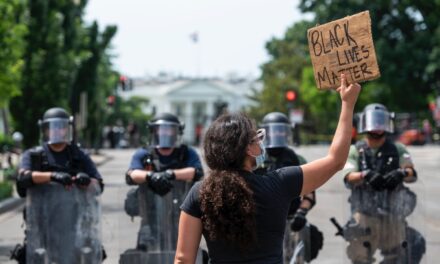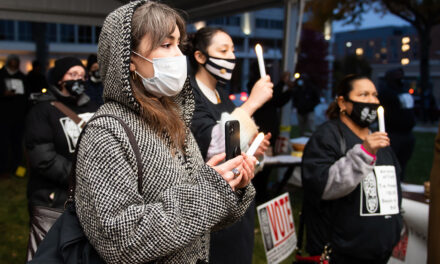The ISNA Green Initiative Team continues to reach out, build relationships, and collaborate to educate everyone about Islam’s environmental justice teachings to address the multi-level climate crisis. Here are some of our recent efforts that promise to move forward, especially toward celebrating our tenth year in service in 2024.
The team continues partnerships with several organizations, among them Wisconsin Green Muslims (WGM); the Chicago Muslims Green Team (CMGT); Faithfully Sustainable (FS); the Association of Muslim Scientists, Engineers, and Technology Professionals (AMSET); the Islamic Medical Association of North America (IMANA), the Pen and Inkpot Foundation and GreenFaith (GF). We appreciate their collaboration.
Representing at the Parliament of World Religions
The Green Initiative Team represented ISNA at the Parliament of the World’s Religions (PoWR) — the world’s largest gathering for interfaith leaders — held on Aug. 14-18 in Chicago. Founded in that city during 1893, this event brings together leaders and followers of all faiths to work together toward a common goal.
This year’s theme was “A Call to Conscience: Defending Freedom and Human Rights,” with a specific focus on fighting authoritarianism. The speakers, panels and programs focused on climate change, human rights, food insecurity, racism, women’s rights and other social justice-related issues.
The ISNA Green Initiative Team participated in several sessions. Huda Alkaff (founder and director, WGM) and Saffet Catovic participated in the “Climate and Environmental Justice” session, which focused on environmental justice as the principle of fairness and equal rights for all people regardless of their differences, specifically with regard to environmental risks and benefits. Although every person has the right to a safe, healthy and sustainable environment, it has been well established for decades that people of color, Indigenous people, and the poor and marginalized are disproportionately affected by environmental dangers, such as toxic pollution and extreme weather.
“Sacrifice zones” exist where polluting facilities are located and toxins are deposited without protection. Other factors impact health and little or no aid is provided to mitigate the negative consequences. Such environmental injustice is systemic.
In this program, environmental justice movement leaders presented on current issues, reported on actions being taken, and made proposals for the way forward. The ethics of environmental justice were considered from diverse religious perspectives, and speakers describe what faith communities are doing — and can do — to engage the climate emergency, loss of biodiversity and pollution to achieve a just transition.
Huda Alkaff, Saffet Catovic and Nana Firman presented in “The Environmental Spirit of Islam: ISNA Green Initiative Team” session. They stressed the Oneness of Allah and His creation, justice, compassionate stewardship, signs of the Creator, trust in the Creator and living in just balance with nature. All of this is led through the optics of faith in action, as manifested by the team’s works and activities that are implementing Islam’s core environmental tenets. They also discussed stewardship as a collective responsibility to care for Earth and each other across all faiths, nationalities, and ethnicities via advocacy, environmental justice, personal lifestyle choices, and consumption.
Huda Alkaff presented in the “Connecting Faith, Environmental Justice, and Solar Power” session. This session dealt with how solar energy’s unifying power can help overcome Islamophobia, sharing her own personal stories and studies in Wisconsin. Exploring faiths united through the Sun’s power and how it can bring people of faith and goodwill together to address the climate crisis; care for Earth and each other; save money to reinvest in missions of justice; move toward an equitable, efficient and renewable energy future; and how to advance just solar energy distribution through building interfaith relationships.
Huda Alkaff, Saiyid Masroor Shah, Saffet Catovic (ISNA Green Initiative) and Layalee Beirat (CMGT) addressed the “Climate and Environmental Justice: Locally and Globally” session. The session dealt with Islamic values related to working together for justice, equity, dignity, inclusion and addressing the climate crisis and environmental injustice.
Representing in New York
Huda Alkaff represented the ISNA Green Initiative Team at the “Muslims for Climate Justice Summit: The Earth as our Amaanah,” by Faithfully Sustainable held Sept. 9-10 in New York City in person, and virtually at the “Climate Justice: What Does Islam Say?” session.
The theme was that as Muslims are Earth’s stewards, we must do everything with the best of intentions and, in addition, are responsible for aiding those disproportionately affected by climate change. A sub-session, “Climate Justice in Islam,” explored the intersection of Islamic values and environmental activism, as well as stressed the importance of addressing the disproportionate impacts of climate change on vulnerable communities.
Nana Firman (senior ambassador, GreenFaith) participated in the “Decoding the Science of Climate Change: Fossil Fuels, Emissions and Carbon Footprints” session, which discussed that paying attention to our planet is a prophetic sunna. Now more than ever, Earth’s climate needs our care and intervention. However, reversing the damage requires that we understand why it is happening.
Members of the ISNA Green Initiative Team participated in the March to End Fossil Fuels, held on Sept. 17 in New York City. This march, part of the Global Fight to End Fossil Fuels, registered 400+ actions, marches, rallies and events worldwide. These mobilizations were coordinated by 780+ endorsing organizations and were expected to draw millions of participants.
These actions are part of a mass global escalation demanding a rapid end to fossil fuels in a just and equitable manner ahead of the UN Climate Ambition Summit, which was held on Sept. 20 in New York City. UN Secretary-General António Guterres has called on world leaders to make ambitious commitments to phase out fossil fuels.
The latest data backs up the International Energy Agency’s finding that no new fossil fuel extraction can be developed under a 1.5°C limit. It also shows that over half of the existing fields and mines could be shut down early while protecting workers and communities. This responsibility lies with the leaders of rich nations that have a historical legacy of pollution to deliver a fast and fair phase out of fossil fuels and fund it globally.
Presenting at the ISNA Convention
ISNA Green Initiative Team also participated in two of the ISNA convention sessions.
During the “Impact of Human-Caused Climate Change on Vulnerable Communities” session, Saiyid Masroor Shah (AMSET) and Marium Husain (IMANA), noted that the global temperature had risen almost 1.5°C above pre-industrial levels and that human-caused greenhouse gas emissions are increasing. With evident consequences from this summer’s record-breaking heat waves across three continents, record low sea ice in Antarctica, flashing red signs of severe climate impacts and the worldwide grave consequences of climate change on the ecosystem, economy, energy, agriculture, health and the economically disadvantaged.
The ISNA Green Initiative team is doing its part to educate and participate in activities related to the environment and climate change. Please join hands to make the world a better place. As God ordained us to be the stewards of Earth, let’s fulfill our responsibility.
ISNA Green Initiative Team: Huda Alkaff, Saffet Catovic, Nana Firman, Uzma Mirza and S. Masroor Shah (Chair)
By the ISNA Green Initiative Team of Huda Alkaff, Saffet Catovic, Nana Firman, Uzma Mirza and S. Masroor Shah (Chair)














